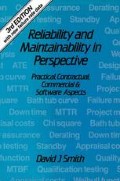Abstract
Failure data can be collected from prototype and production models or from the field. In either case a formal failure-reporting document is necessary in order to ensure that the feedback is both consistent and adequate. Field information is far more valuable since it concerns failures and repair actions which have taken place under real conditions. Since recording field incidents relies on people, it is subject to errors, omissions and misinterpretation. It is therefore important to collect all field data using a formal document. Information of this type has a number of uses, the main two being feedback, resulting in modifications to prevent further defects, and the acquisition of statistical reliability and repair data. In detail then:
-
They indicate design and manufacture deficiencies and can be used to support reliability growth programmes.
-
They provide quality and reliability trends.
-
They provide subcontractor ratings.
-
They contribute statistical data for future reliability and repair time predictions.
-
They assist second line maintenance (workshop).
-
They enable spares provisioning to be refined.
-
They enable routine maintenance intervals to be revised.
-
They enable the field element of quality costs to be identified.
A failure reporting system should be established for every project and product. Customer co-operation with a reporting system is essential if feedback from the field is required and this could well be sought, at the contract stage, in return for some other concession.
Preview
Unable to display preview. Download preview PDF.
Copyright information
© 1988 David J. Smith
About this chapter
Cite this chapter
Smith, D.J. (1988). Making Use of Field Feedback. In: Reliability and Maintainability in Perspective. Palgrave, London. https://doi.org/10.1007/978-1-349-10140-5_11
Download citation
DOI: https://doi.org/10.1007/978-1-349-10140-5_11
Publisher Name: Palgrave, London
Print ISBN: 978-1-349-10142-9
Online ISBN: 978-1-349-10140-5
eBook Packages: EngineeringEngineering (R0)

